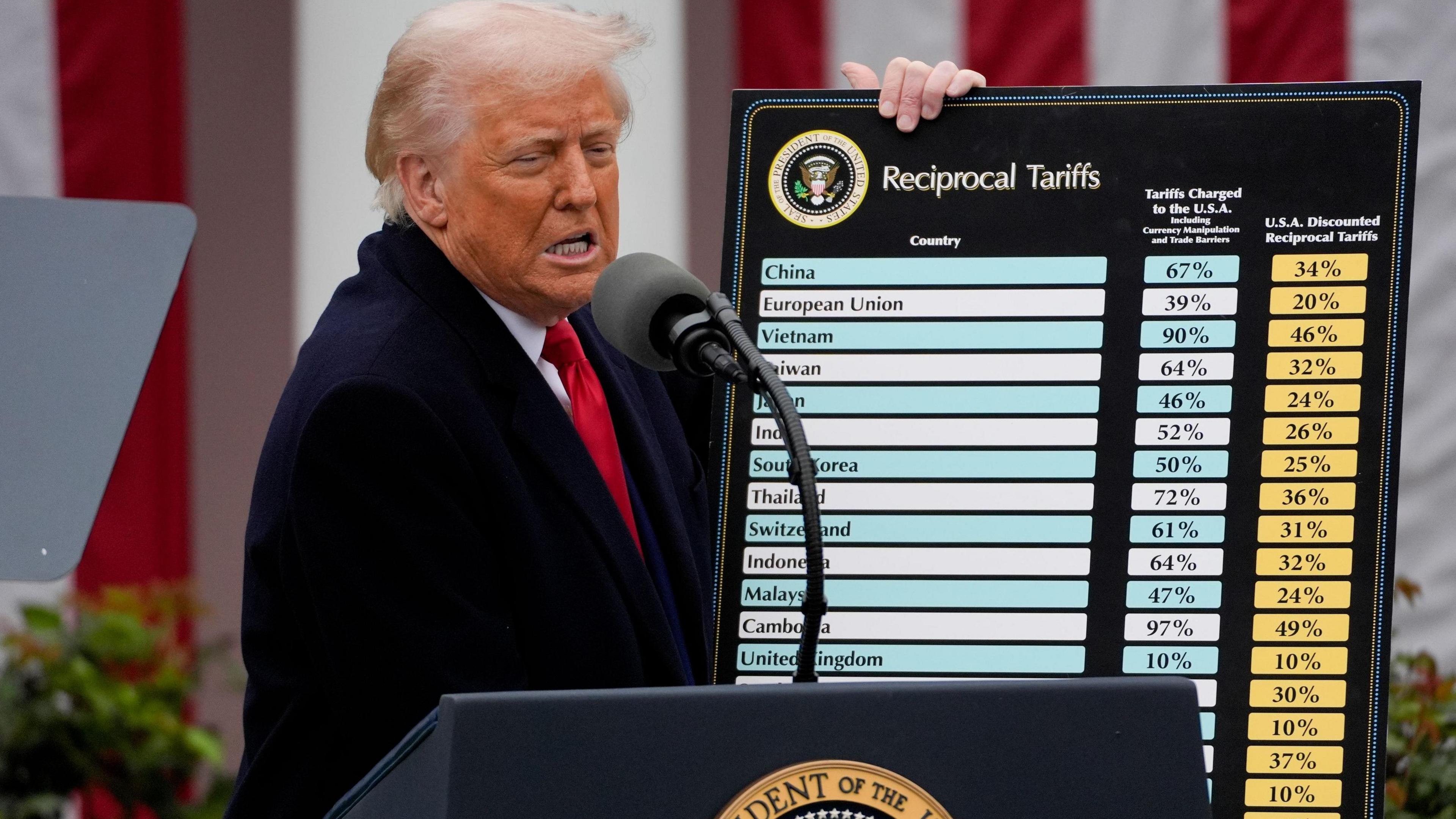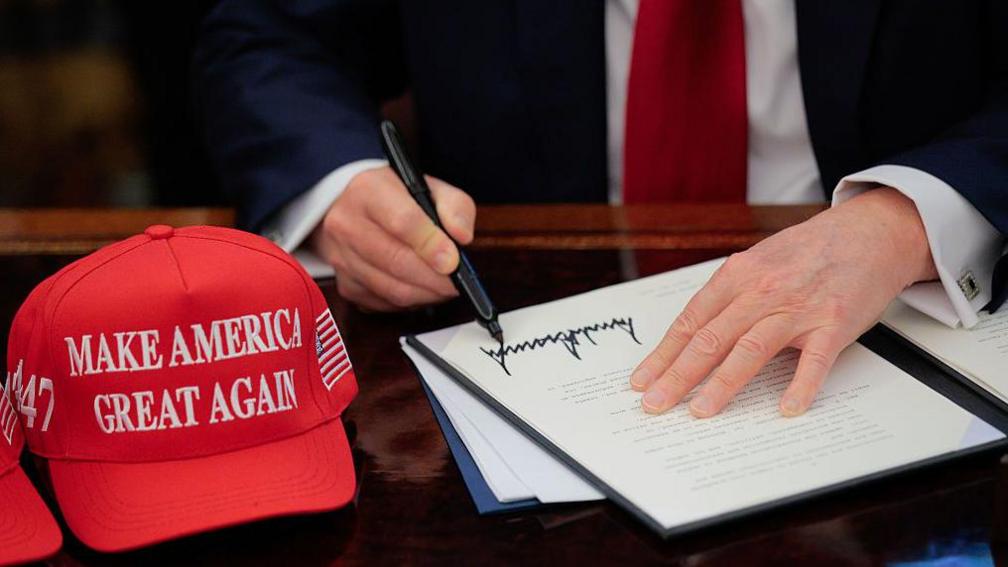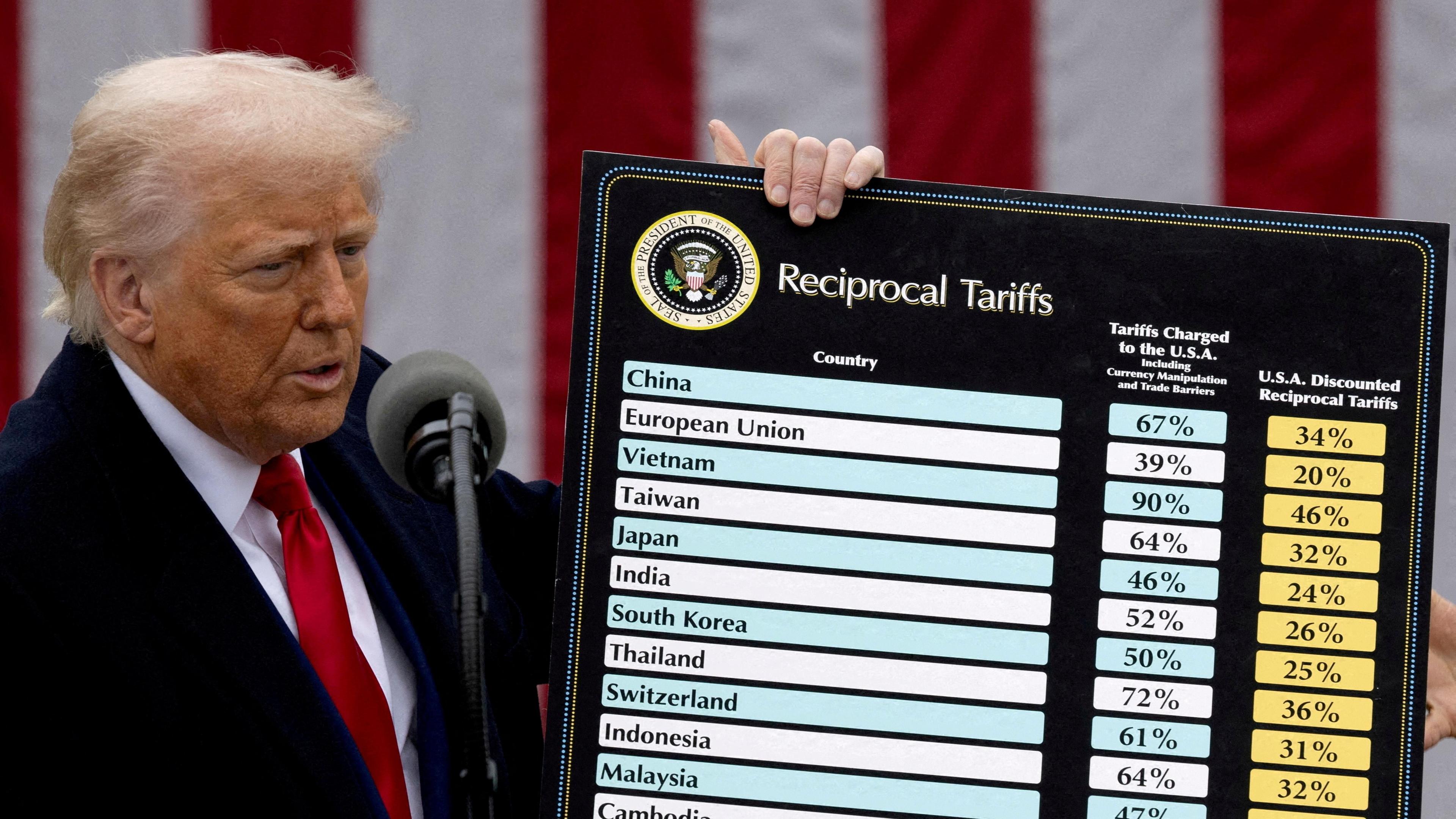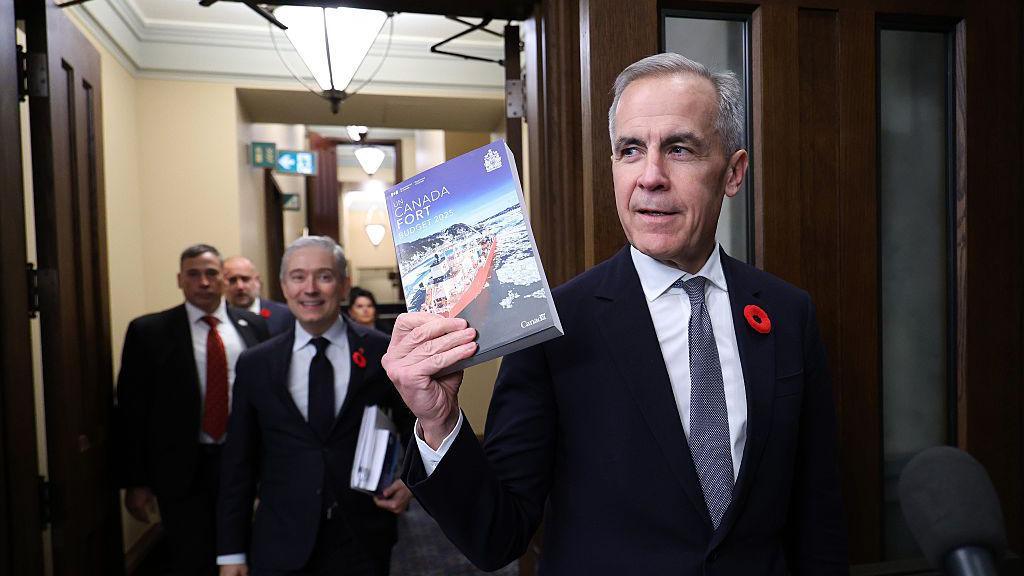Conservative justices sharply question Trump tariffs in high-stakes hearing

- Published
President Donald Trump's use of sweeping tariffs faced sharp questioning at the Supreme Court on Wednesday, in a case with major implications for the president's agenda and the global economy.
A majority of justices, including several conservatives, expressed doubts about the White House's justification of the import duties, which the president has said are necessary to restore America's manufacturing base and fix its trade imbalance.
The measures are being challenged by a number of small businesses and a group of states, which contend that the president has overstepped his authority in imposing the levies, which are in effect a tax.
America's top court - which has a 6-3 conservative majority - usually takes months to reach big decisions, but many expect it to move faster in this case, which is also seen as the first major test of the Trump administration's push to expand presidential power.
"And so is it your contention that every country needed to be tariffed because of threats to the defense and industrial base? I mean, Spain? France?" asked Amy Coney Barrett, who was appointed to the court by Trump.
"I could see it with some countries but explain to me why as many countries needed to be subject to the reciprocal tariff policy as are."
Billions of dollars in tariff payments are at stake. If the Trump administration loses, the government could have to refund some of the billions of dollars it has collected, a process that Barrett noted could become a "complete mess".
The White House, which sent Treasury Secretary Scott Bessent, Commerce Secretary Howard Lutnick and US Trade Representative Jamieson Greer to the hearing, has said that they will turn to other tariff authorities if the court does not rule in its favour.
"The White House is always preparing for Plan B," White House press secretary Karoline Leavitt said ahead of the hearing.
Appearing on Fox News on Wednesday after the hearing, Trump said that he thought the day went well.
He added that it would be "devastating" for the country if the administration lost the case and called it "one of the most important cases in the history of our country".
Arguing over 'country-killing' crises
The case centres around a 1977 law, the International Emergency Economic Powers Act (IEEPA), that gives the president the power to "regulate" trade in response to an emergency.
Trump first invoked IEEPA in February to tax goods from China, Mexico and Canada, saying drug trafficking from those countries constituted an emergency.
He deployed it again in April, ordering levies from 10% to 50% on goods from almost every country in the world. This time, he said the US trade deficit - where the US imports more than it exports - posed an "extraordinary and unusual threat".
Those tariffs took hold in fits and starts this summer while the US pushed countries to strike "deals".
The Trump administration has argued that the power to regulate includes the power to impose tariffs and that the nation faced unique crises – ones that were "country-killing and not sustainable" - that necessitated emergency action by the president.
Arguing for the administration, Solicitor General John Sauer warned that if Trump's tariff powers were ruled illegal, it would expose the US to "ruthless trade retaliation" and lead to "ruinous economic and national security consequences".
Watch: How a Supreme Court case could upend Trump’s tariffs
Implications of the case
The justices' questions suggested they were wrestling with the implications of what a ruling in favour of the administration might mean for the future.
"The justification is being used for power to impose tariffs on any product from any country in any amount, for any length of time," Chief Justice John Roberts said.
Under the Constitution, America's founding legal document, Congress, not the president, holds the power to tax and the court has traditionally set limits in how much of that authority it can hand over.
If the court ruled for Trump in this case, Judge Neil Gorsuch, another conservative, wondered: "What would prohibit Congress from just abdicating all responsibility to regulate foreign commerce?"
He added that he was "struggling" to find a reason to buy Sauer's arguments.
"Could the president impose a 50 percent tariff on gas-powered cars and autoparts to deal with the unusual and extraordinary threat from abroad of climate change?" he asked.
Tariffs v taxes
Lawyers for the challenging states and private groups say that the law makes no mention of the word "tariffs" and argue that Congress did not intend to give the president an "open-ended power to junk" other existing trade deals and tariff rules.
Neil Katyal, making the case for private businesses, said the law did give the president power to cut off trade with an embargo or a quota, but a revenue-raising tariff was a step too far.
The justices spent relatively little time on questions about refunds or whether the president's emergency declarations were warranted.
Instead they focused on the text of IEEPA and its history. While presidents have used it frequently to impose sanctions, Trump is the first to invoke it for tariffs.
Sauer urged the justices to understand tariffs as a natural extension of other powers granted to the president under the law rather than a tax.
"I can't say it enough - it is a regulatory tariff, not a tax," he said.
At another point, he argued the power to raise revenue was "only incidental" - despite the president's frequent boasts about the money being raised via tariffs.
The distinction between tariffs and a tax appeared to be a stumbling block for many of the justices.
"You want to say that tariffs are not taxes but that's exactly what they are," Justice Sonia Sotomayor said.
Others justices expressed doubts about putting limits, especially in a national security and foreign policy context.
Justice Brett Kavanaugh said that it did not seem like "common sense" to give the president the power to block trade, but not impose a 1% tariff.
Reaction from a full house
The case has implications for an estimated $90bn worth of import taxes already paid - roughly half the tariff revenue the US collected this year through September, according to Wells Fargo analysts. Trump officials have warned that sum could swell to $1tn if the court takes until June to rule.
The hearing drew a full audience and stretched nearly three hours, far longer than the judges had officially allotted for the arguments.
If a majority of the Supreme Court rules in Trump's favour, it will overturn the findings of three lower courts that already ruled against the administration.
Sarah Wells, the chief executive and founder of Sarah Wells Bags, sat on the steps outside the court with a group of other small business owners listening to the arguments.
Her business, which designs bags for breast pumps and other items that it manufactures overseas, paid roughly $20,000 in unexpected tariffs earlier this year, then stopped bringing in goods, as it tried to switch its supply chain. She has sold out of inventory, halted product development and laid off some staff.
But she said she had been encouraged by what she heard.
"I think that they really understood the overreach that I believe the president has done under IEEPA," she said. "I got the sense that they have the sense that this has to be reined in."
Related topics
- Published5 November

- Published5 November

- Published5 November
